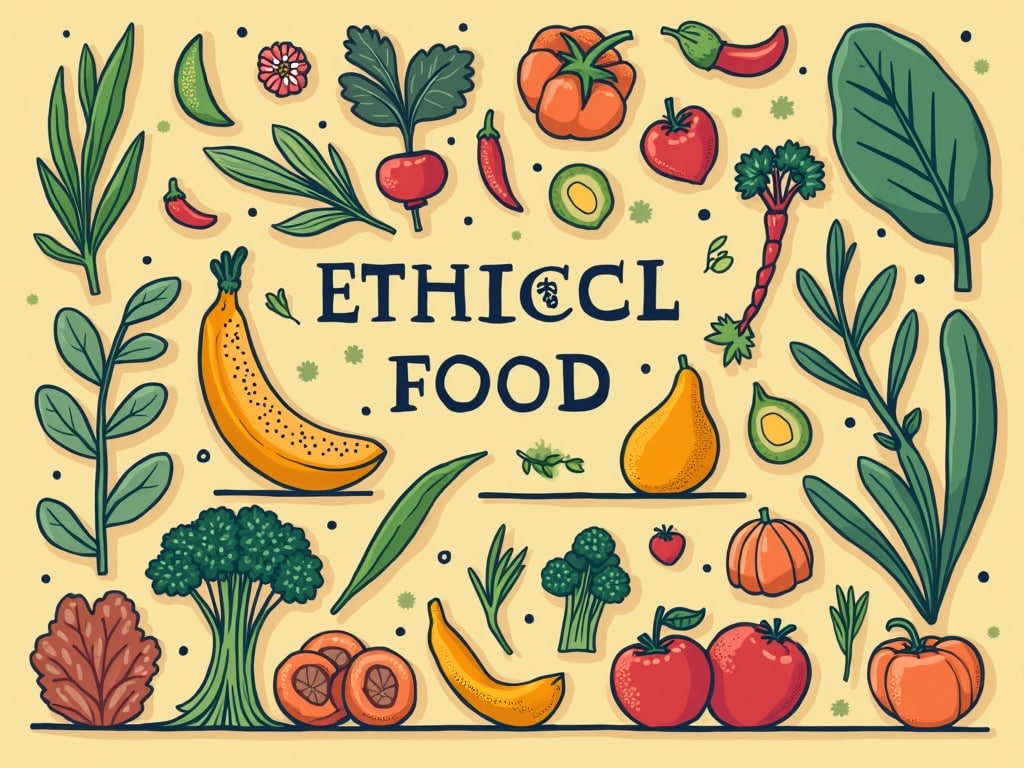The Ethics of Our Food System: A Deep Dive
Imagine biting into a juicy, perfectly ripe strawberry. The burst of sweetness is a simple pleasure, but behind that single bite lies a complex web of ethical considerations. Where was it grown? How were the workers treated? What impact did its production have on the environment? These questions scratch the surface of a much larger issue: the ethics of our food system.
What Does Ethical Food Really Mean?
Defining ethical food isn’t as straightforward as slapping a label on a product. It’s a multifaceted concept encompassing a range of values and concerns, including:
- Animal Welfare: How animals are raised, treated, and slaughtered for food production.
- Environmental Sustainability: The impact of food production on the planet, including resource depletion, pollution, and climate change.
- Fair Labor Practices: Ensuring fair wages, safe working conditions, and the right to organize for farmworkers and food industry employees.
- Food Justice: Addressing inequities in access to healthy, affordable food, particularly for marginalized communities.
- Transparency and Traceability: Knowing where our food comes from and how it was produced.
These elements are interconnected, creating a complex web of ethical considerations that we must navigate as consumers, producers, and policymakers. Ignoring one aspect can undermine progress in others. For example, focusing solely on reducing carbon emissions from agriculture without addressing worker exploitation would be an incomplete, and ultimately unethical, approach.
The Ethical Challenges We Face
Our current food system faces numerous ethical challenges that demand urgent attention.
Animal Welfare Concerns
Factory farming practices often prioritize efficiency and profit over the well-being of animals. Confined spaces, lack of access to the outdoors, and painful procedures are common occurrences. The ethical question here is whether we have the right to inflict such suffering on sentient beings for the sake of cheaper meat, eggs, and dairy.
Environmental Degradation
Industrial agriculture contributes significantly to environmental problems like deforestation, soil erosion, water pollution, and greenhouse gas emissions. The overuse of pesticides and fertilizers harms biodiversity and contaminates ecosystems. The ethical dilemma is how to balance food production with the need to protect our planet for future generations.
Labor Exploitation
Farmworkers, who are often among the lowest-paid and most vulnerable members of society, face harsh working conditions, exposure to hazardous chemicals, and lack of access to healthcare. The ethical question is whether we are willing to tolerate the exploitation of these essential workers to keep food prices low.
Food Deserts and Food Insecurity
Millions of people, particularly in low-income communities, live in food deserts with limited access to fresh, healthy food. This contributes to diet-related diseases and perpetuates cycles of poverty. The ethical imperative is to ensure that everyone has access to nutritious, affordable food, regardless of their socioeconomic status or geographic location.

The Role of Consumer Choices
As consumers, we have the power to influence the ethics of our food system through our purchasing decisions. By making informed choices, we can support businesses and practices that align with our values and create demand for more ethical products.
Supporting Sustainable Agriculture
Choosing locally sourced, organic, and regeneratively produced food can help reduce environmental impact, support local farmers, and promote biodiversity. Look for certifications like USDA Organic, Certified Humane, and Fair Trade to help guide your choices.
Reducing Meat Consumption
Animal agriculture has a significant environmental footprint, particularly beef production. Reducing our meat consumption, even by a small amount, can make a big difference. Consider incorporating more plant-based meals into your diet and exploring meat alternatives.
Avoiding Food Waste
A staggering amount of food is wasted each year, contributing to greenhouse gas emissions and resource depletion. By planning meals, storing food properly, and composting food scraps, we can reduce waste and minimize our environmental impact.
Demanding Transparency
Support companies and brands that are transparent about their sourcing, production practices, and labor standards. Ask questions, do your research, and let businesses know that you value ethical and sustainable practices.
The Power of Policy and Systemic Change
While individual consumer choices are important, systemic change is necessary to address the root causes of ethical problems in our food system. This requires policy interventions, industry reforms, and collective action.
Strengthening Regulations
Governments can play a crucial role in setting standards for animal welfare, environmental protection, and labor practices. Stronger regulations can help level the playing field and ensure that all businesses are held accountable for their ethical performance.
Supporting Fair Trade and Small-Scale Farmers
Policies that support fair trade, promote local food systems, and provide resources for small-scale farmers can help create a more equitable and sustainable food system.
Investing in Research and Innovation
Investing in research and development of sustainable agricultural practices, alternative proteins, and food waste reduction technologies is essential for creating a more resilient and ethical food system.
Addressing Food Insecurity
Government programs like SNAP (Supplemental Nutrition Assistance Program) and WIC (Women, Infants, and Children) can help address food insecurity and improve access to healthy food for low-income communities. However, these programs need to be adequately funded and expanded to reach all those who need them.
Moving Towards a More Ethical Food Future
Creating a truly ethical food system is a complex and ongoing process. It requires a collective effort from consumers, producers, policymakers, and researchers. By embracing ethical values, making informed choices, and advocating for systemic change, we can work towards a future where food production is both sustainable and just. It’s a future where that strawberry tastes even sweeter, knowing it was grown with respect for people, animals, and the planet.
